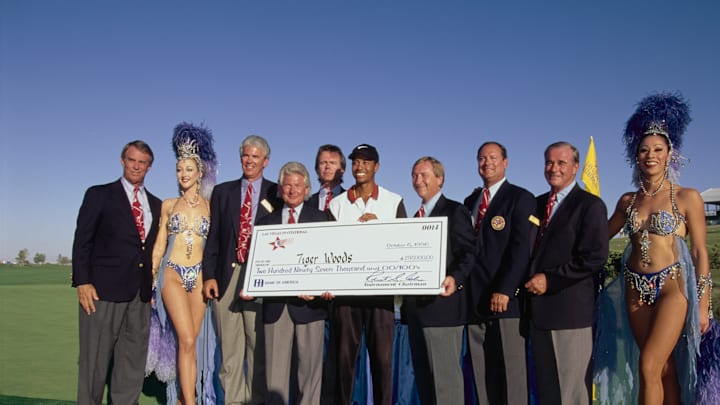The Las Vegas event was first played in 1983, and the purse was the biggest all season: $1,052,000. First place that year paid the winner, Fuzzy Zoeller, $135,000.
It was the only tournament with that kind of cash at a time when most tournaments paid between $300,000 and $500,000 in total for the entire field. The Doral-Eastern (a now-defunct airline) Open paid $300,000, for example, and the Masters paid $500,000. The Players at that time was an exception, paying $700,000, with the winner receiving $135,000.
So, a tournament that doubled or tripled the best pay that everyone usually got was big news as far as golf went. Players would beat a path to the door, wanting a chance at the top prize.
And that’s what happened with Las Vegas. It continued to have high purses, offering $1,122,500 in 1984, $950,000 in 1985, and $1,150,000 in 1986. There was some kind of difference between official and unofficial money with the tournament for the first few years, but that got sorted out by 1986. It was probably done because the winner would automatically jump to the top of the money list with that victory
In 1987, things changed.
The Panasonic Las Vegas Invitational paid players $1,250,000 in official money.
Also that year, the purse wars began. Las Vegas was eclipsed by a final event of the year, sponsored by Nabisco, which offered $2,000,000 to the top 30 players on the money list. Big time golf had arrived.
Nevertheless, all kinds of name golfers won in Las Vegas, from Zoeller, who won the first one, to Greg Norman in 1986, Paul Azinger in 1987, John Cook (now on Golf Channel) in 1992, Davis Love III in 1993, and Tiger Woods in 1996, his first victory. Recent Presidents Cup captain Jim Furyk won the tournament three times (1995,1998,1999), winning $1.8 million at that event alone. More recently Webb Simpson, Smylie Kaufman, Patrick Cantlay, and Bryson DeChambeau took home the winner’s share. Tom Kim has won the last two.
By comparison to the 1980s, in August, Scottie Scheffler took home $25 million for winning the Tour Championship. Calculate the inflation factor on your own. (It’s enough of a shock to go to the grocery store.)
The Nabisco money, which was intertwined through both the regular tour and the champions tour, lasted until 1990 for the PGA Tour when Nabisco was bought by KKR. KKR wanted to cancel all the Tour’s Nabisco contracts which ran through several different sponsorship platforms on both tours, culminating in the year-end Nabisco Championship on the PGA Tour and the Vantage Championship on PGA Tour Champions. However, the Vantage Championship ran until 2002.
The cancellation of agreements led Deane Beman, then commissioner of the PGA Tour, to adopt a policy of vowing not to ever give any company the naming rights to the Tour Championship. (At least that is how it was explained to me back in the Jurassic Period when all this was happening.) So far, that has continued with Coca-Cola having the Presenting Sponsorship of the Tour Championship, but it’s not called the Coca-Cola Tour Championship as much as they might like it to be.
One other tournament outlasted everything else, and that is the Nabisco Dinah Shore, later the Kraft Nabisco. That sponsorship ended in 2014.
A long and convoluted tale of what happened to Nabisco and to golf as collateral damage is the subject of a book Barbarians at The Gate: The Fall of RJR Nabisco. The book is mostly about the business deal, a leveraged buyout. There's a little bit of golf involved because of the sponsorships that Nabisco had. But most of it is a contest between Henry Kravis, George R. Roberts, Jerome Kohlberg Jr., aka KKR, and the late Ted Forstmann, one of the founding partners of Forstmann Little & Company, who bought IMG after Mark McCormack's death, and the late Ross Johnson, then CEO of Nabisco.
